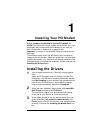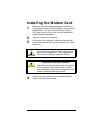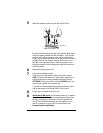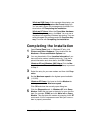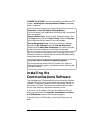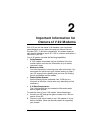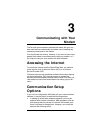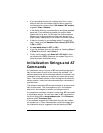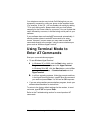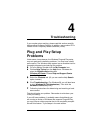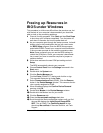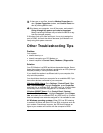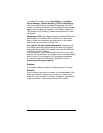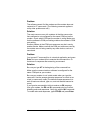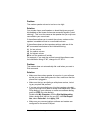
12 PCI Modem User’s Guide
•
If you are asked to select the “modem type”
from a menu,
and you don’t see this modem listed by name, select the
most descriptive name such as
V.92 modem
,
56K modem
,
or generic
Class 1 Modem
.
•
In the dialing directory,
set all entries to the highest possible
baud rate
, if your software and serial port support these
speeds (do not go over 115,200 bps). All communications
between the computer and the modem take place at this
higher speed, independent of the modem-to-modem speed.
•
If there is a section of your software called “Terminal Set-
tings,” make sure that
Hardware Flow Control (RTS/CTS)
is
ON
(or
YES
).
•
Set
auto baud detect
to
OFF
(or
NO
).
•
If your fax software gives you the option of selecting
Class 1
or
Class 2
fax drivers, select
Class 1
.
•
Finally, some programs ask
Send init if CD high?
, which
you should
set to
YES
. Otherwise, the modem may not re-
ceive the proper initialization string.
Initialization Strings and AT
Commands
An initialization string is a group of
AT
command settings that is
sent to the modem as soon as you start up the software. The
software determines which commands should be included in the
initialization string, based on the device you select during instal-
lation. The commands remain in effect throughout the communi-
cations session, unless the software sends other commands to
override them.
The software uses other
AT
command strings for all commands
sent to the modem. This is transparent to you—the software
does this in the background without you being aware of it.
It is sometimes necessary, however, to add other
AT
commands
to initialization strings. You can find a table of
AT
commands on
the World Wide Web at
www.modems.com
. Click
Reference
and then on
AT Command Sets
.
If your software suggests an initialization string for this modem,
you should use it. If your software does not list this modem and
no initialization string is suggested, use the following:
AT &F
.



